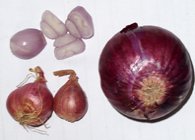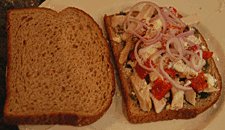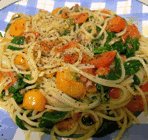Selection and storage
Fresh shallots can be readily available during the spring and early summer seasons. Wet and humid conditions hamper their flavor and storage life. In the supermarkets, however, you can choose from fresh, frozen, canned, pickled, powdered, and dehydrated shallots.
While buying fresh produce, look for well-developed, clean, uniform bulbs with dry, thin, coppery-brown, outer scales.
Like in onions, avoid those that show sprouting or signs of black mold (a type of fungal attack) as they indicate old stock. Also, poor-quality bulbs often bulbs often inflicted by soft spots, moisture at their neck, and dark patches, which may all be indications of decaying.
Unlike onions, eschalots tend to perish early. At home, store them in a cool dark place away from moisture and humid conditions where they keep fresh for several days. They can also keep well in the refrigerator; however, you should use them soon after you remove them from the fridge since they tend to spoil soon if they are kept at room temperature for a while.
Preparation and serving methods
 |
| Shallots and onion; note the size difference. |
Unlike in onions, shallots will not hurt your palate, or sinuses, or burn the tongue. They are sweeter and gently pungent in flavor than onions. Also, unlike garlic, they have less of an impact on your breath smell.
To prepare, trim the ends using a paring knife. Then peel the outer 2-3 layers of skin until you find fresh thick pinkish-white whorls. Small shallots may be used as a whole, or you can slice or cut them into fine cubes/rings depending upon the recipe, in a way similar to onions.
Being smaller, eschalots cook easily. Eschalots, indeed, cook easily because of their smaller size.
Here are some serving tips:

|
| Shallot served over a sandwich! Photo: addpowers |
-
Fresh shallots are being either used in salads; whole or chopped into cubes.
-
In much of Asian cooking, the bulbs are employed liberally in the preparation of curries, gravy, chutney, soups, stews, and paste.

|
| Spaghetti prepared with spinach, eschalots and cherry tomatoes. Photo: naotakem |
-
Thinly sliced bulbs caramelized and served as a spicy garnish over burgers, grilled chicken, parathas, kachori, pakora (India and Pakistan), etc.
-
Like in onions, they are one of the common ingredients in pasta, pizza, noodles, stew-fries, spice stuffing, etc.
-
The bulbs are also used in pickling, sauces, etc.
Safety profile
Although not as severe as onions, raw shallots can cause irritation to skin, mucosa membranes, and eyes. This effect is because of the release of allyl sulfide gas while chopping or slicing them, which when comes in contact with a moist surface turns into sulfuric acid.
Allyl sulfide is concentrated more at the ends, particularly in the root end. Its effect can be minimized by immersing the trimmed bulbs in cold water for a few minutes before you chop or slice them. (Medical disclaimer).
Also read on <<Vidalia Onion Nutrition Facts
Read on <<Onion Nutrition Facts & Health Benefits
≺≺ Back to Vegetables from Shallots. Visit here for an impressive list of vegetables with complete illustrations of their nutrition facts and
health benefits.
≺≺ Back to Home page.
Further reading:
-
Refer Stanford School of Medicine Cancer information Page-Nutrition to reduce cancer risk (Link opens in new window).
-
Gernot Katzar’s spices pages.
-
USDA National Nutrient Database.

